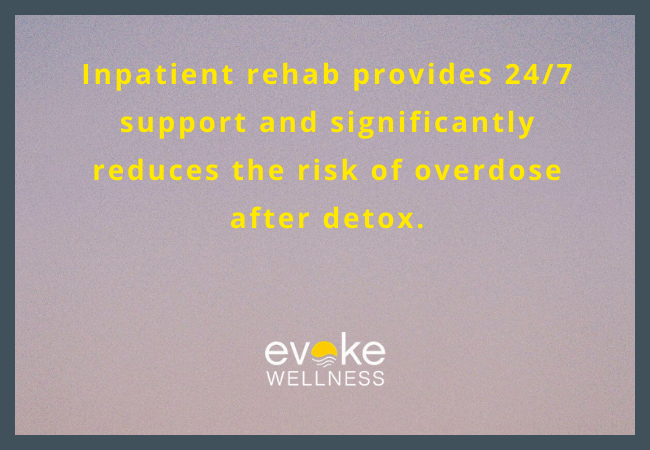Beginning inpatient rehab is one of the most courageous and life-changing decisions a person can make. The first week is both a critical and transformative period in the recovery journey. It is when the body begins healing from substance use, the mind starts adjusting to new routines, and individuals begin building the foundation for long-term sobriety.
At Evoke Wellness, we recognize that the unknown can feel overwhelming. Understanding what to expect during the first week of inpatient rehab can reduce fear and help clients feel more prepared and confident about entering treatment. Let’s explore what this experience typically includes and how we support each individual every step of the way.
Day 1: Admission and Orientation
Upon arrival, clients are warmly welcomed by our admissions team. The first day primarily consists of intake assessments, medical evaluations, and getting settled into the facility. This initial process is vital in creating a personalized treatment plan tailored to the individual’s medical history, substance use patterns, mental health needs, and treatment goals.
Medical and Psychological Assessments
During intake, clients undergo thorough evaluations from licensed professionals, including:
-
A physical health exam
-
Mental health screenings
-
Substance use history
-
Risk assessment for withdrawal complications
These assessments help ensure the safety and comfort of each client during the early stages of rehab.
Orientation
After medical clearance, clients are introduced to the facility, the daily schedule, and expectations for participation. They’ll meet staff members and may be assigned a primary therapist. This orientation helps ease anxiety and gives individuals a better sense of their surroundings and what lies ahead.
Days 2–3: Detoxification (If Not Already Completed)
Depending on the client’s needs, detoxification may still be ongoing during the early part of the first week. Although many people transition to inpatient rehab after completing detox, some may enter while still stabilizing. In these cases, they continue receiving around-the-clock medical supervision to manage withdrawal symptoms safely and comfortably.
During detox, clients begin receiving emotional support, nutritional care, and rest. Once they are physically stable, they gradually begin participating in therapeutic activities.
Days 3–4: Introduction to Therapy
Once medically cleared, clients begin attending therapy sessions. These may start as brief, low-pressure meetings that allow the individual to become comfortable with the therapeutic environment. Early sessions focus on identifying treatment goals and building trust with their primary therapist.
Individual Therapy
One-on-one sessions are designed to explore the client’s history, triggers, coping mechanisms, and motivations for recovery. These sessions are crucial in developing personalized strategies for healing.
Group Therapy
While intimidating for some at first, group therapy often becomes one of the most impactful parts of rehab. Early in the first week, clients join small groups to discuss shared experiences and support each other’s progress. Trained therapists guide these discussions to ensure they are safe and constructive.
Days 4–5: Structured Daily Routine
By the middle of the first week, most clients are fully integrated into the program’s schedule. Inpatient rehab offers a structured environment that fosters stability and personal responsibility.
A typical daily schedule includes:
-
Morning meditation or mindfulness
-
Healthy meals
-
Group therapy sessions
-
Psychoeducational classes
-
Recreational or holistic activities
-
Individual therapy
-
Evening reflections
This consistent routine allows clients to focus on their recovery, reduce anxiety, and begin rebuilding healthy habits.
Days 5–6: Psychoeducation and Skill Building
Rehab is not just about abstaining from substances—it’s about learning how to live a new life. By the end of the first week, clients begin engaging more deeply in psychoeducation groups that teach them about the science of addiction, the impact of drugs and alcohol on the brain and body, and essential life skills.
Common topics include:
-
Understanding relapse triggers
-
Stress management techniques
-
Healthy communication
-
Emotional regulation
-
Building support systems
Learning these tools early helps individuals become more resilient and better equipped for challenges ahead.
Day 7: Settling In and Looking Ahead
The seventh day often brings a mix of emotions. By this point, many clients have overcome the hardest physical symptoms and started to experience mental clarity. Others may still be adjusting, which is completely normal.
Clients typically meet with their case manager or therapist to review their first week, reflect on progress, and refine treatment goals. Family contact may begin at this point through phone calls or therapeutic family sessions, depending on the program’s policies.
There’s also time for personal reflection. Clients might begin journaling, meditating, or reading inspirational materials as they settle into their new path. Small accomplishments—such as completing a full group or speaking up in a session—are celebrated as part of the journey forward.
Emotional Landscape of the First Week
Emotionally, the first week can be a rollercoaster. Clients may feel relief, hope, fear, sadness, and everything in between. Withdrawal symptoms, homesickness, and vulnerability can be intense. But so is the support.
Staff members are trained to help clients navigate this emotional terrain. Whether it’s through counseling, peer support, or compassionate care from nurses and techs, no one has to go through it alone.
The sense of community that begins to form during this time is one of the most powerful aspects of inpatient rehab. Sharing space with others on the same journey fosters connection, accountability, and lasting support.
The Role of Personalized Care
What makes the first week at Evoke Wellness unique is our commitment to individualized treatment. Every person arrives with a different story, and we tailor our approach to meet their specific needs. Whether someone needs trauma-informed care, co-occurring mental health treatment, or a focus on relapse prevention, we provide the right support from day one.
Our multidisciplinary team includes therapists, physicians, nurses, case managers, and peer support specialists who work together to create a healing environment that nurtures the whole person—body, mind, and spirit.
Why Choose Evoke Wellness for Inpatient Rehab?
Choosing where to start your recovery journey is an incredibly important decision. At Evoke Wellness, we are known for our compassionate care, clinical excellence, and individualized approach to treatment. We offer a safe, structured, and serene environment where healing can begin without judgment.
Our Intensive Inpatient Treatment Program in Ohio is designed for individuals who need comprehensive support in the early stages of recovery. Whether you’re transitioning from detox or starting treatment for the first time, we provide around-the-clock care and evidence-based therapies to help you build a solid foundation.
Our facility also integrates services for co-occurring disorders, ensuring that mental health needs are addressed alongside addiction. Through our Mental Health Treatment Program in Ohio, we support clients with depression, anxiety, trauma, and more—all within the same structured setting.
As part of our broader network of Addiction Treatment Programs in Ohio, Evoke Wellness offers seamless transitions between detox, inpatient, and outpatient care, so individuals never have to navigate recovery alone. We understand that recovery is about more than just stopping substance use—it’s about rediscovering yourself and creating a life worth living. We’re here to help you every step of the way.
Conclusion
The first week of inpatient rehab is a pivotal chapter in the story of recovery. It marks the beginning of healing—physically, emotionally, and spiritually. At Evoke Wellness, we support clients through every moment of this transition, offering safety, structure, and compassion when they need it most.
From intake to therapy to emotional support, our goal is to make this process as smooth and empowering as possible. Recovery doesn’t happen all at once—it begins one day at a time, and it starts with a single step. If you or someone you love is considering inpatient treatment, don’t wait. Call us today at 866.430.9267 to learn how Evoke Wellness can help you begin your recovery journey with confidence.
Frequently Asked Questions
What is inpatient rehab like on the first day?
The first day of inpatient rehab typically includes medical and psychological assessments, meeting with the care team, and getting oriented to the facility. This day is focused on making clients feel safe, welcomed, and informed.
Will I begin therapy right away?
Most clients begin therapy within the first few days, depending on their physical and mental stability. Once cleared, you’ll participate in individual and group therapy, as well as structured daily activities.
Do I need to complete detox before starting inpatient rehab?
Not always. If you haven’t completed detox, Evoke Wellness can help you transition into care safely. We ensure 24/7 medical supervision until you are stable enough to begin full programming.
What kinds of therapy are offered during inpatient rehab?
Therapies may include cognitive-behavioral therapy (CBT), group counseling, psychoeducation, family therapy, and holistic approaches like meditation and recreational therapy.
Can my family contact me during the first week?
Policies vary, but generally, there is a brief adjustment period before phone calls or visits are allowed. Therapeutic family involvement often begins shortly after the first week.
What should I bring with me to inpatient rehab?
You should bring comfortable clothing, basic hygiene items (non-aerosol), any necessary prescriptions, and a journal or reading material. We will provide a complete checklist before admission.
How long does inpatient rehab typically last?
Length of stay varies depending on individual needs, but most inpatient programs last between 28 and 45 days. Your treatment plan will be customized to support your recovery goals.



